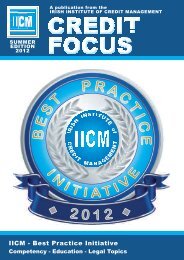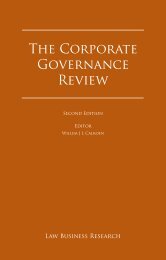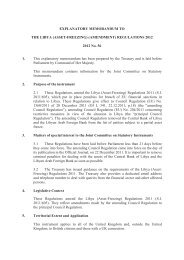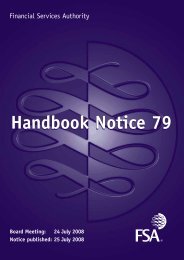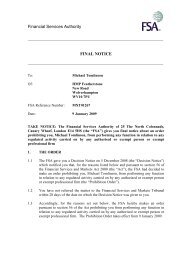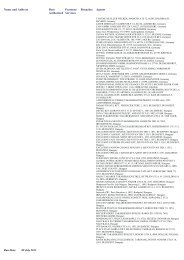FSA Annual Report 2006/07 - Better Regulation Ltd
FSA Annual Report 2006/07 - Better Regulation Ltd
FSA Annual Report 2006/07 - Better Regulation Ltd
You also want an ePaper? Increase the reach of your titles
YUMPU automatically turns print PDFs into web optimized ePapers that Google loves.
Section two – Helping retail consumers achieve a fair deal<br />
<strong>FSA</strong> <strong>Annual</strong> <strong>Report</strong> <strong>2006</strong>/<strong>07</strong><br />
31<br />
Unfair contract terms<br />
The statement of good practice on mortgage exit administration fees we<br />
published in January 20<strong>07</strong> will benefit millions of consumers. The<br />
statement contained a practical solution, endorsed by the Council of<br />
Mortgage Lenders, to prevent firms unfairly increasing mortgage exit<br />
administration fees. A number of firms have put aside reserves to cover the<br />
cost of compensation in relation to these fees.<br />
In September <strong>2006</strong> we published a statement from the Building Societies<br />
Association (BSA) about a model term which was used by several building<br />
societies in their contracts. This term potentially restricted customers’<br />
access to their savings accounts. The BSA agreed to amend the term and<br />
anticipates that this could benefit about 15m savers.<br />
In September <strong>2006</strong> Scottish Widows Bank plc agreed to amend a term in its<br />
lifetime mortgage contracts to allow customers (rather than Scottish<br />
Widows) to decide what to do with any insurance money received if their<br />
property suffered damage. This affected at least 32,000 of their customers.<br />
We believe about 30 other providers of lifetime mortgages have similar<br />
terms and we encourage them to take this agreement into account.<br />
During a risk assessment visit we identified deficiencies in a firm’s<br />
corporate governance arrangements, its systems and controls and its<br />
arrangements for managing conflicts of interest. A lack of balance on the<br />
Board between executive and non-executive directors and weak controls<br />
allowed the Chief Executive Officer to exert a dominant influence over the<br />
firm. Following our visit, the firm reviewed the structure and membership of<br />
the Board and the accountability of the executive directors. The firm now<br />
has a much stronger governance and control structure.<br />
In January 20<strong>07</strong> we fined W Deb MVL (formally Williams de Broe) £560,000<br />
for breaches of our Principles for Businesses. Over a three-year period,<br />
failings in its senior management arrangements, systems and controls<br />
resulted in poor accounting systems and poor client money protection.<br />
The failings led to a combined provision of £66.3 million being made in its<br />
accounts for 2004 and 2005 for amounts viewed as irrecoverable.<br />
We found widespread control failings in a firm which had moved into<br />
unfamiliar markets. The extent of these failings meant the firm’s solvency<br />
position had been weakened and we agreed the firm would stop taking on<br />
new business until it improved its systems and controls. In response to an<br />
independent expert’s findings, the firm reassessed its strategy and improved<br />
its risk management. This has strengthened the firm’s solvency position.<br />
Soundly managed firms<br />
We continue our work to ensure<br />
firms are soundly managed. Our<br />
information from risk assessments<br />
undertaken during the year has<br />
shown a decline in the number of<br />
significant risks relating to the<br />
sound management of firms. We<br />
believe this is an indication of the<br />
effectiveness of our risk-based<br />
supervisory work, with firms<br />
increasingly taking positive steps to<br />
meet our standards.<br />
Over the last year we have taken a<br />
more principles-based approach to<br />
our corporate governance<br />
discussions with firms; we expect<br />
firms to be able to show how their<br />
governance arrangements deliver<br />
effective oversight and scrutiny of<br />
their business. Where we have<br />
confidence in a firm’s governance<br />
arrangements we are also placing<br />
greater reliance on their senior<br />
management to manage regulatory<br />
risks, which means that wellmanaged<br />
firms can expect less<br />
regulatory intervention.<br />
Through our supervisory work with<br />
firms we also seek to gain an<br />
understanding of their strategy. This<br />
helps us to identify the business risks<br />
they face and assess the extent to<br />
which they have controls in place to<br />
manage these risks. It also helps us<br />
to understand what impact external<br />
events, for example changes in<br />
economic conditions, have on their<br />
risk profile. We expect firms to be<br />
able to demonstrate that they<br />
understand their business risks and,<br />
where appropriate, have plans to<br />
mitigate them.



